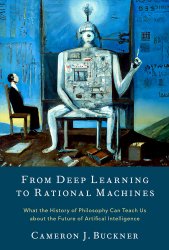From Deep Learning to Rational Machines: What the History of Philosophy Can Teach Us about the Future of Artificial Intelligence
- Добавил: literator
- Дата: 10-02-2024, 06:37
- Комментариев: 0
 Название: From Deep Learning to Rational Machines: What the History of Philosophy Can Teach Us about the Future of Artificial Intelligence
Название: From Deep Learning to Rational Machines: What the History of Philosophy Can Teach Us about the Future of Artificial IntelligenceАвтор: Cameron J. Buckner
Издательство: Oxford University Press
Год: 2024
Страниц: 301
Язык: английский
Формат: epub (true)
Размер: 14.1 MB
This book provides a framework for thinking about foundational philosophical questions surrounding the use of deep artificial neural networks ("Deep Learning") to achieve Artificial Intelligence. Specifically, it links recent breakthroughs to classic works in empiricist philosophy of mind. In recent assessments of Deep Learning's potential, scientists have cited historical figures from the philosophical debate between nativism and empiricism, which concerns the origins of abstract knowledge. These empiricists were faculty psychologists; that is, they argued that the extraction of abstract knowledge from experience involves the active engagement of psychological faculties such as perception, memory, imagination, attention, and empathy. This book explains how recent Deep Learning breakthroughs realized some of the most ambitious ideas about these faculties from philosophers such as Aristotle, Ibn Sina (Avicenna), John Locke, David Hume, William James, and Sophie de Grouchy. It illustrates the utility of this interdisciplinary connection by showing how it can provide benefits to both philosophy and Computer Science: computer scientists can continue to mine the history of philosophy for ideas and aspirational targets to hit, and philosophers can see how some of the historical empiricists' most ambitious speculations can now be realized in specific computational systems.
The Chapter 1 provides an overview of Deep Learning and its characteristic strengths and weaknesses. The remaining chapters of the book offer an empiricist account of a mental faculty and explore attempts to integrate aspects of the faculty into a Deep Learning architecture. In the course of our exploration, we will explain how each faculty’s activities might improve the performance of an artificial agent. We will ask whether the addition of the faculty enables the resulting architecture to achieve new kinds of rational decision-making. Chapter 2 lays out some methodological preliminaries of this task, including specific tiers of rationality and principles for fair evaluation. Chapter 3 focuses on the faculty of perception and how DCNNs might reveal generative difference-makers in human perception by deploying structures that perform multiple forms of abstraction from sensory experience emphasized by historical empiricists. Chapter 4 reviews attempts to model the role of memory in Deep Learning systems, focusing on architectures like the Episodic Controller (EC). Chapter 5 discusses attempts to model the imagination using architectures like GANs and Variational AutoEncoders (VAEs), and Chapter 6 highlights various tweaks inspired by aspects of attention, such as transformers. Chapter 7 reviews more nascent attempts to model human social and moral cognition—focusing especially on the faculty of empathy/sympathy—ending with some speculative suggestions for future research to model cultural and social learning in empiricist, DNN-based agents. The course of each chapter reflects the book’s interdisciplinary goals.
Скачать From Deep Learning to Rational Machines: What the History of Philosophy Can Teach Us about the Future of Artificial Intelligence
[related-news] [/related-news]
Внимание
Уважаемый посетитель, Вы зашли на сайт как незарегистрированный пользователь.
Мы рекомендуем Вам зарегистрироваться либо войти на сайт под своим именем.
Уважаемый посетитель, Вы зашли на сайт как незарегистрированный пользователь.
Мы рекомендуем Вам зарегистрироваться либо войти на сайт под своим именем.
